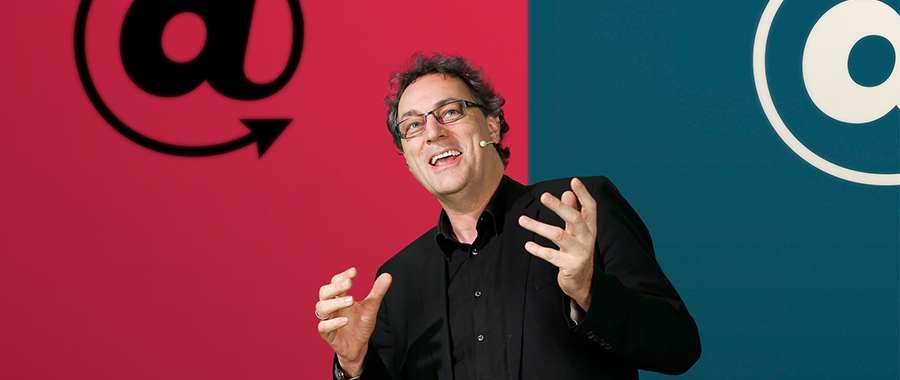EXCLUSIVE INTERVIEW WITH GERD LEONHARD – PART TWO

Welcome to Part Two of my exclusive interview with Gerd Leonhard. We all see how technology is impacting society, business, and service divisions. And how exponential it is growing. But what should we really look out for in the near future? Are machines really intelligent, or are they as dumb as a toaster? Are 3D printed steaks any good? Is AI life-threatening, or just job-threatening? Read on more as I chat with Gerd Leonhard, Service Mastery Day host at this year’s 12th Aftermarket Business Platform in Berlin, October 17-19.
Continued…
T.I: What are your thoughts on Blockchain?
G.L: Blockchain is amazing but primarily a super fancy database that replaces central control and the cost of the central control. It’ll be a big deal in transportation, logistics and smart contracts by creating a cheap way to do agreements and exchange of information.
In financial services, it might work for low end transactions for peer to peer services, but on a large scale it won’t be accepted by governments. Money is a public matter, and governments need to hold on to the accountability for money, because someone needs to be there in the end to cover it. So Blockchain is huge but I don’t see it happening in banking anytime soon, except maybe for swift and back end systems of credit cards transaction.
T.I: We talked about work displacement. What can humans do about it?
G.L: Computers don’t do relationships, they don’t do engagements, they don’t do soft factors. If they could, they would in any case be fake. Computers are for facts. I think it’s Kevin Kelly who said, “computers are for answers, humans are for questions”. So, it’ll be perfectly fine, if a snowstorm hits an airport and flights are cancelled and 40 000 people need to rebook their flights: that should be a chatbot because AI can do rebook all 40 000 people in 40 seconds.
There’ll be jobs machines can do, and others that only humans can do and that we shouldn’t touch. We shouldn’t let a machine decide if a couple should have a baby or not. The machine can give feedback, just like they do now, but we shouldn’t always make efficiency the top priority.
In some cases, efficiency is so important that nothing else really matters, like rebooking … or driving. There’s no moral concerns to driving the right way.
Other areas where efficiency is not important, like dating, or hiring and firing, human resources, where a computer will not understand what you’re trying to say with relationships and engagements. They may eventually be able to understand what we’re trying to say but won’t be in a position to feel it.
We think too much about all the great things machines can do and take away our own skills. It’s very important in customer service. It all comes down to engagement and trust, not efficiency. Peter Drucker said that strategy eats technology for breakfast, I like to say that culture eats technology for breakfast.
T.I: What about 3D Printing?
G.L: Prototyping is everywhere. What’s happening is we need more composite materials and more advances in material sciences to print complicated structures. We can print fake wood, but not wood. We can print fake earlobe, but not an earlobe.
We’re going to make major breakthroughs so that in the next couple of years, an industrial printer can print 150 different composite materials and new kinds of plastics. 3D printed parts will be one tenth of the cost and all you need will be the license to print the authentic piece. That will hugely change shipping, manufacturing, customer service… I put a timeframe of 10 years, when you will have giant 3D printers driving around in trucks, driving from one place to the next to print on-demand.
Like airports, instead of having an airplane transporting goods, you’ll have 3D printing facilities that’ll be highly secured and licensed with the right products, and the costs will be like spotify, 90% less. That will happen for sure in many commodity jobs for printing like in construction, you will be able to print the beams and some of the structures on ships, you can print that on location.
There are many things we can’t quite print yet, but for example food, you’ll be able to print that soon. Lab growing meat already exists, it’s completely organic, it’s actual meat, you can take that substance and print from it.
People shouldn’t underestimate 3D Printing because it hasn’t really worked or is too expensive. Right now, such a 3D Printer will cost 2 million €, it will be 100 000 in less than 10 years. It will be everywhere. If we monitor all progress of science and nanomaterials, there are breakthroughs every day.
